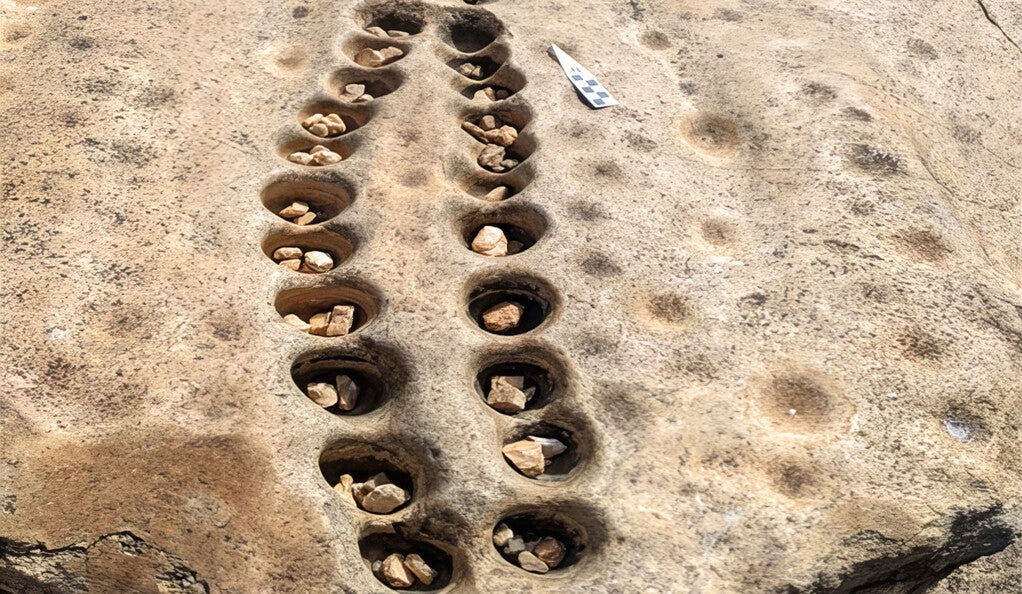🧐 Ancient Beat #96: Leisure, hallucinogenics, and not-so-abrupt tool revolutions
Hi folks! It’s Friday and this is issue #96 of Ancient Beat. I hope you all have a wonderful weekend ahead! And, of course, please enjoy the latest ancient news. 👇
🗞 Ancient News: Top 5
Innovation in Stone Tool Technology Involved Multiple Stages at the Time of Modern Human Dispersals, Study Finds — A new study challenged the notion of a single "revolution" in stone tool technology during Homo sapiens' Eurasian dispersal around 50,000 to 40,000 years ago at the transition between the Middle Paleolithic and the Upper Paleolithic. Traditionally, the change in tech is thought to have been an abrupt event that enabled us to outcompete Neanderthals. But this study suggests a gradual evolution, highlighting the development of bladelet technology after initial dispersals.
Hollowed Out Bone Containing Hallucinogenic Seeds Found at Roman-Period Settlement — A hollowed goat femur containing black henbane seeds was found at a Roman-period settlement in the Netherlands, marking the first conclusive evidence of the plant's intentional use, likely as a medicine or narcotic. Henbane is poisonous and can be used for its medicinal or psychoactive properties. It was documented by ancient historians and physicians for its sedative and analgesic effects. The container and seeds seem to have been left as an offering in a pit.
Possible Ancient Game Boards Identified in Kenya — In Kenya's Lewa Wildlife Conservancy, archaeologists have found rock surfaces with rows of shallow pits, believed to be ancient game boards for a two-person strategy game called Mancala. Herders may have played while their flocks grazed. There are also burial cairns and evidence of ritual fasting nearby. According to Veronica Waweru , “It’s a valley full of these game boards, like an ancient arcade. Given the erosion of some of the boards, I believe people were playing these games there a very long time ago.”
"Flat-Packed Furniture for the Next Life": Roman Funerary Bed Found in London — Archaeologists in London have unearthed a Roman funerary bed, marking the first discovery of its kind in Britain. Found in a former Roman cemetery, the bed, alongside five oak coffins, dates back to between 43-410 CE. The bed was made from oak and featured carved feet and joints connected by wooden pegs. It was preserved by the waterlogged conditions near the River Fleet. According to Michael Marshall, “We didn’t know that people were buried in these kinds of Roman burial beds at all. That’s something that there is no previous evidence for from Britain.” Personal objects like beads, a glass vial, and a lamp with a defeated gladiator design were uncovered elsewhere in the cemetery.
UE Archaeologists Conduct Study of Amazonian Cave Homes — In the Amazon Basin, researchers uncovered evidence of early human occupation in rock shelters dating back around 13,000 years. These sites, located in northwest Colombia, reveal insights into the lives of some of South America's earliest inhabitants. Artifacts include vibrant cave paintings made with ochre, stone tools, and evidence of plant management and animal hunting. Findings also indicate the use of these shelters for both domestic and ritual activities, with a continuous human presence until the 17th century. According to Jo Osborn, “All of the rock shelters exhibit ochre paintings from the earliest occupations, indicating that those pioneers were also recording and making sense of this new world they encountered.”
That’s it for the free Top 5! If you’re a free subscriber, sign up for the paid plan for another 20 stories and 7 recommended pieces of content covering prehistoric mobility, advanced medical tools, horse statues (that are not tanks after all), log coffins, Neanderthal creativity, and a daring high-altitude archaeologist.
Thanks, folks!
-James
Twitter: @jamesofthedrum
P.S. If you want access but it’s a little too steep for you right now, just email me — I want this to be accessible.
P.P.S. Paid members, read on!



